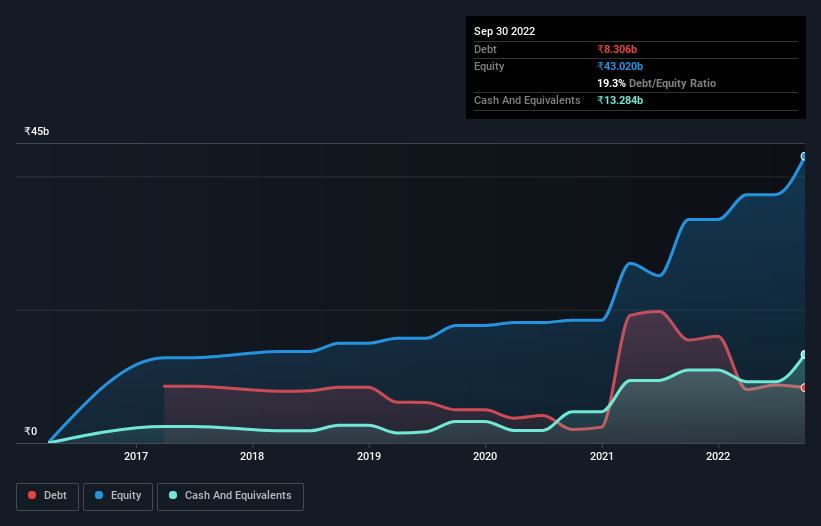- India
- /
- Auto Components
- /
- NSEI:TIINDIA
Tube Investments of India (NSE:TIINDIA) Has A Rock Solid Balance Sheet

Some say volatility, rather than debt, is the best way to think about risk as an investor, but Warren Buffett famously said that 'Volatility is far from synonymous with risk.' So it seems the smart money knows that debt - which is usually involved in bankruptcies - is a very important factor, when you assess how risky a company is. We note that Tube Investments of India Limited (NSE:TIINDIA) does have debt on its balance sheet. But is this debt a concern to shareholders?
When Is Debt A Problem?
Debt is a tool to help businesses grow, but if a business is incapable of paying off its lenders, then it exists at their mercy. Ultimately, if the company can't fulfill its legal obligations to repay debt, shareholders could walk away with nothing. However, a more common (but still painful) scenario is that it has to raise new equity capital at a low price, thus permanently diluting shareholders. Of course, plenty of companies use debt to fund growth, without any negative consequences. When we think about a company's use of debt, we first look at cash and debt together.
View our latest analysis for Tube Investments of India
What Is Tube Investments of India's Debt?
As you can see below, Tube Investments of India had ₹8.31b of debt at September 2022, down from ₹15.5b a year prior. But on the other hand it also has ₹13.3b in cash, leading to a ₹4.98b net cash position.

How Healthy Is Tube Investments of India's Balance Sheet?
Zooming in on the latest balance sheet data, we can see that Tube Investments of India had liabilities of ₹50.3b due within 12 months and liabilities of ₹3.97b due beyond that. Offsetting these obligations, it had cash of ₹13.3b as well as receivables valued at ₹21.1b due within 12 months. So it has liabilities totalling ₹19.9b more than its cash and near-term receivables, combined.
Given Tube Investments of India has a market capitalization of ₹490.3b, it's hard to believe these liabilities pose much threat. However, we do think it is worth keeping an eye on its balance sheet strength, as it may change over time. Despite its noteworthy liabilities, Tube Investments of India boasts net cash, so it's fair to say it does not have a heavy debt load!
On top of that, Tube Investments of India grew its EBIT by 71% over the last twelve months, and that growth will make it easier to handle its debt. When analysing debt levels, the balance sheet is the obvious place to start. But it is future earnings, more than anything, that will determine Tube Investments of India's ability to maintain a healthy balance sheet going forward. So if you want to see what the professionals think, you might find this free report on analyst profit forecasts to be interesting.
Finally, a business needs free cash flow to pay off debt; accounting profits just don't cut it. While Tube Investments of India has net cash on its balance sheet, it's still worth taking a look at its ability to convert earnings before interest and tax (EBIT) to free cash flow, to help us understand how quickly it is building (or eroding) that cash balance. During the last three years, Tube Investments of India produced sturdy free cash flow equating to 64% of its EBIT, about what we'd expect. This free cash flow puts the company in a good position to pay down debt, when appropriate.
Summing Up
We could understand if investors are concerned about Tube Investments of India's liabilities, but we can be reassured by the fact it has has net cash of ₹4.98b. And we liked the look of last year's 71% year-on-year EBIT growth. So is Tube Investments of India's debt a risk? It doesn't seem so to us. We'd be very excited to see if Tube Investments of India insiders have been snapping up shares. If you are too, then click on this link right now to take a (free) peek at our list of reported insider transactions.
At the end of the day, it's often better to focus on companies that are free from net debt. You can access our special list of such companies (all with a track record of profit growth). It's free.
Valuation is complex, but we're here to simplify it.
Discover if Tube Investments of India might be undervalued or overvalued with our detailed analysis, featuring fair value estimates, potential risks, dividends, insider trades, and its financial condition.
Access Free AnalysisHave feedback on this article? Concerned about the content? Get in touch with us directly. Alternatively, email editorial-team (at) simplywallst.com.
This article by Simply Wall St is general in nature. We provide commentary based on historical data and analyst forecasts only using an unbiased methodology and our articles are not intended to be financial advice. It does not constitute a recommendation to buy or sell any stock, and does not take account of your objectives, or your financial situation. We aim to bring you long-term focused analysis driven by fundamental data. Note that our analysis may not factor in the latest price-sensitive company announcements or qualitative material. Simply Wall St has no position in any stocks mentioned.
About NSEI:TIINDIA
Tube Investments of India
Engages in the manufacture and sale of precision engineered and metal formed products to automotive, railway, construction, agriculture, etc.
Excellent balance sheet with questionable track record.


